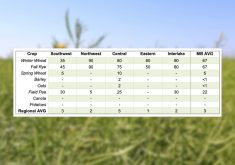“But today, I think you can test for everything except for the existence of God. So, we’re screwed.”
– Ed Rempel
Resolut ions aimed at cur ing both present and future headaches caused by genetically modified crops were discussed at the latest Keystone Agricultural Producers general council.
Two resolutions were approved, one to look at organizing a consumer boy-cot t of European Union exports over “unfairly restrictive” testing protocols in the wake of the Triffid scandal , and another to support the Manitoba Forage Seed Association in holding the Canadian government responsible for any economic losses that may result from lost export markets due to the introduction of Roundup Ready alfalfa in Canada.
Read Also

Manitoba boosts stake in cereals centre to $20 million
Premier Wab Kinew said the additional project funds will help ‘Trump-proof’ the provincial economy.
In his motion calling for a boycott of EU products, KAP District 6 director Ed Rempel said that because the EU’s tolerance limits for GM-contaminated flax – at an estimated one seed in 40,000 – are “asking for the impossible,” farmers should find a way to strike back.
“It would have been possible to meet 20 years ago, because testing equipment probably did not exist,” he said, introducing the motion. “But today, I think you can test for everything except for the existence of God. So, we’re screwed.”
PANDERING
The Europeans, in “pander ing to special interest groups,” are “not playing nice in the sandbox,” he added.
“Why? It’s because they can. What is our response? If we sit here thinking that this is all going to get cleared up by itself, we are sadly mistaken,” he said. “No amount of testing can clear a load.”
One possible solut ion, said Rempel, would be to assemble a panel of experts to examine ways to pressure the Europeans to relax their extreme opposition to GM flax and lift testing thresholds.
“Europe is vulnerable. They have huge exports in cars and chemicals, including many of the fine products that we use on our farms,” he said. “My question is: What is our response?”
Paul Gregory, a forage seed producer from Fisher Branch, spoke against the motion, noting that European opposition to GM crops is firmly entrenched, with strong backing from powerful farm organizat ions and green lobby groups.
“I talk to Europeans on the phone every week,” he said. “They have their position and I don’t see it changing in our lifetime. It’s a way of life.”
SEEKING PUBLIC SUPPORT
But in closing the debate, Rempel noted that European attempts at erecting walls, from the Berlin Wall to the Maginot Line, have all ended in fai lure. He added that those who spoke against the motion hadn’t provided any better ideas.
“I think if you ask Canadians to help you out on this, they just might say yes,” said Rempel. “Let’s support this motion and see what KAP can come up with.”
On the issue of Roundup Ready alfalfa, the resolution noted that data from field trials in Western Canada by Forage Genetics International and Monsanto could be submitted for review this year to the Pesticide Management Regulatory Authority.
Gregory, who introduced the motion, said that because Roundup Ready technology has already been approved, a private company would only need to secure variety registration before it could begin marketing seed.
“It’s ready to go,” said Gregory.
If it is approved and grown by farmers, contamination by pollen transfer could result in the loss of a multimillion-
dollar market for alfalfa seed in not only the EU, but also New Zealand and Saudi Arabia, he added.
Also, if GM alfalfa seed contaminated other crop shipments or hay shipments, more Triffid-style problems could result.
RAISE AWARENESS
KAP president Ian Wishart said that the motion could make government “much more aware” of the consequences of their approval process.
“What they do has consequences for us all,” he said.
Dan Mazier, Justice-area farmer, noted that in the Triffid instance, had the GM technology used not been approved for use in Canada, the developers could have been held liable for the economic losses being suffered by farmers today.
“I speak in favour of it, but we’re holding the government accountable? We should be holding the seed companies accountable,” he said.
“I speak in favour of it, because somebody’s got to stop it somewhere.”
But Theresa Bergsma, a KAP board executive for special crops and vegetables, noted that farmers already grow a lot of GM corn and canola and are reaping the benefits in ease of weed management.
If farmers move to hold government accountable for GM mishaps, then government might abandon its position in favour of science-based research and close the door to future technological progress that could benefit agriculture, she said.
“They might just start saying, ‘no, no, no’ to research,” said Bergsma. [email protected]














